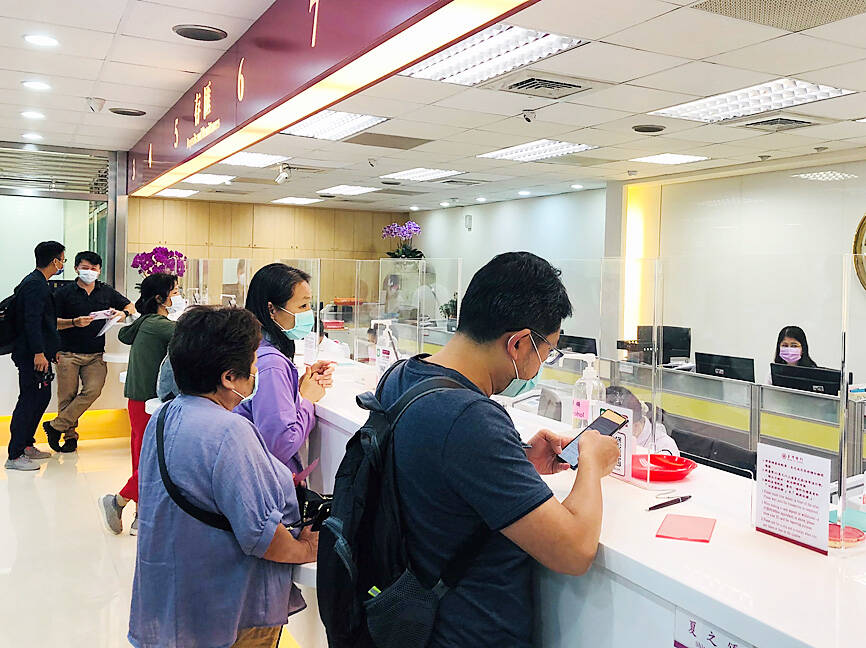The Bankers Association of the ROC (銀行公會) yesterday introduced a relief measure aimed at shoring up local companies hit by liquidity pressures following the US’ announcement of a 32 percent “reciprocal” tariff on Taiwanese goods on April 2 — a move that was followed by a 90-day reprieve a week later.
The measure, approved by the Financial Supervisory Commission, was to take effect after member banks were notified yesterday, it said.
Under the plan, companies that remain operational and continue to meet their debt and interest obligations may apply for a six-month extension on principal maturing due before Dec. 31, it said.

Photo: Kelson Wang, Taipei Times
For new loans issued under the government’s program to mitigate the impact of tariffs, lenders should ease collateral requirements, the association said.
Specifically, if the Small and Medium Enterprise Credit Guarantee Fund of Taiwan (信保基金) provides a guarantee covering more than 80 percent of the loan, banks should refrain from requesting additional guarantors beyond the company’s responsible parties, and should avoid asking for deposits as collateral, it added.
Financial institutions have also been instructed to expedite loan processing to ensure the timely release of funds, it said.
The measures are aimed at providing critical liquidity support and mitigating operational risks for Taiwan’s export-oriented businesses amid rising global trade tensions, it added.
Small and medium-sized manufacturers of non-tech products are considered less financially equipped to weather external shocks, it said.
The association has also urged banks to adopt a streamlined credit assessment process.
For loans that are fully guaranteed, banks may waive the requirement to collect audited financial statements and instead adopt simplified credit review procedures, it said.
In cases where loan guarantees are only partial and the new borrowing exceeds NT$30 million (US$924,214) after new borrowing, audited financial statements may be submitted within three months, the association said.
Loans of NT$15 million or less should also qualify for simplified reviews, it added.
As for existing debt, businesses seeking to extend loans totaling up to NT$200 million that are due to mature before the end of this year may be exempt from providing updated financial projections, the association said.

Taiwan Semiconductor Manufacturing Co (TSMC, 台積電) last week recorded an increase in the number of shareholders to the highest in almost eight months, despite its share price falling 3.38 percent from the previous week, Taiwan Stock Exchange data released on Saturday showed. As of Friday, TSMC had 1.88 million shareholders, the most since the week of April 25 and an increase of 31,870 from the previous week, the data showed. The number of shareholders jumped despite a drop of NT$50 (US$1.59), or 3.38 percent, in TSMC’s share price from a week earlier to NT$1,430, as investors took profits from their earlier gains

In a high-security Shenzhen laboratory, Chinese scientists have built what Washington has spent years trying to prevent: a prototype of a machine capable of producing the cutting-edge semiconductor chips that power artificial intelligence (AI), smartphones and weapons central to Western military dominance, Reuters has learned. Completed early this year and undergoing testing, the prototype fills nearly an entire factory floor. It was built by a team of former engineers from Dutch semiconductor giant ASML who reverse-engineered the company’s extreme ultraviolet lithography (EUV) machines, according to two people with knowledge of the project. EUV machines sit at the heart of a technological Cold

Taiwan’s long-term economic competitiveness will hinge not only on national champions like Taiwan Semiconductor Manufacturing Co. (TSMC, 台積電) but also on the widespread adoption of artificial intelligence (AI) and other emerging technologies, a US-based scholar has said. At a lecture in Taipei on Tuesday, Jeffrey Ding, assistant professor of political science at the George Washington University and author of "Technology and the Rise of Great Powers," argued that historical experience shows that general-purpose technologies (GPTs) — such as electricity, computers and now AI — shape long-term economic advantages through their diffusion across the broader economy. "What really matters is not who pioneers

TAIWAN VALUE CHAIN: Foxtron is to fully own Luxgen following the transaction and it plans to launch a new electric model, the Foxtron Bria, in Taiwan next year Yulon Motor Co (裕隆汽車) yesterday said that its board of directors approved the disposal of its electric vehicle (EV) unit, Luxgen Motor Co (納智捷汽車), to Foxtron Vehicle Technologies Co (鴻華先進) for NT$787.6 million (US$24.98 million). Foxtron, a half-half joint venture between Yulon affiliate Hua-Chuang Automobile Information Technical Center Co (華創車電) and Hon Hai Precision Industry Co (鴻海精密), expects to wrap up the deal in the first quarter of next year. Foxtron would fully own Luxgen following the transaction, including five car distributing companies, outlets and all employees. The deal is subject to the approval of the Fair Trade Commission, Foxtron said. “Foxtron will be